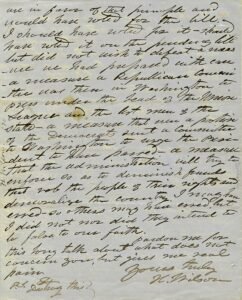“IN VOTING AGAINST THE AMENDMENT THAT WAS SURE TO DEFEAT ONE OF THE MOST IMPORTANT MEASURES BEFORE CONGRESS – A MEASURE INTENDED TO ABATE AN EVIL THAT WAS WORKING DEMORALIZATION IN THE COUNTRY, ESPECIALLY IN NEW YORK, NEW JERSEY, AND PENNSYLVANIA. I DID NOT SUPPOSE THAT ANYONE WOULD DOUBT MY FIDELITY TO EQUAL RIGHTS. I HAVE MADE MORE SPEECHES FOR OUR IDEAS OF EQUAL RIGHTS IN MORE STATES AND TO MORE PEOPLE THAN ANY MAN IN THIS COUNTRY. THERE ARE MORE ACTS OF MINE IN THE LAWS FOR LIBERTY THAN ANY PUBLIC MAN DEAD OR LIVING AND THE RECORD WILL SHOW IT.”
WILSON, HENRY (1812-1875). Vice President of the United States under U.S. Grant, and a Senator from Massachusetts known for his strong anti-slavery positions; devoted himself to the destruction of ‘Slave Power’ [the political power of the slave-owning class]; authored a bill that outlawed slavery in Washington, D.C. and was responsible for incorporating African Americans in the Union Civil War effort. Superb Autograph Letter Signed, “H. Wilson.” Four very full pages, quarto. Natick, [Massachusetts]. October 7, 1870. To” My Dear Bird”. Wilson writes:
“You will I hope pardon me for troubling you with this note. You have been my friend for many years. We have not always agreed. You have sometimes sharply criticized words and acts of mine, but I have loved you none the less.
I write to say to you in confidence that the course of our friend Robinson towards me is very cruel – that it has grieved me more than I can express to you. When he wrote in the Republican his very curt notice of my vote and remarks I did not suppose that he is his heart felt unkind to me. I felt that it was hard but did not think that he was my enemy. We had been friends for years. I would have gone to the ends of the country to do him a favor. I counted him as one of my dearest friends for whom I entertained sincerest regard. I felt his cutting criticisms but through he would see that I had done no wrong – that if I had made a mistake it was only and error of judgment, but he seems to act as though he believed I had been false to a principle to which I stood committed by the words and acts of more than thirty years. I feel this deeply I assure you – not because it may do me harm – but because it is the act of one I held near and dear. I would like to go back to the Senate, but God knows I do not want to go enough to make me break with the friends I love. My home is desolate – my friends are dearer to me than ever.
If I felt I had done wrong I might bear this – might think it just and to be borne as punishment. But I know I intended no wrong and my conscience and reason approve what I did. In voting against the amendment that was sure to defeat one of the most important measures before Congress – a measure intended to abate an evil that was working demoralization in the country, especially in New York, New Jersey, and Pennsylvania., I did not suppose that anyone would doubt my fidelity to equal rights. I have made more speeches for our ideas of equal rights in more states and to more people than any man in this country. There are more acts of mine in the Laws for Liberty than any public man dead or living and the record will show it. Yet your friend seems to think – because I did not vote to put a principle on a bill when I knew it would defeat the bill and be lost itself – that I have disowned my faith. At least four fifths of the Republicans in Congress are in favor of that principle and would have voted for the bill. I should have voted for it – should have voted it on the preceding bill but did not wish to defeat a measure we had prepared with care – a measure the Republican Committee was then in Washington to press under the lead of the Union League and the best men of the state – a measure that even a portion of the Democrats sent a committee to Washington to urge the President to have passed – a measure that the administration will enforce so as to diminish frauds that rob the people of their rights and demoralize the country. I may have erred – so other may have erred, but I did not nor did they intend to be false to our faith. Pardon me for this long talk about what does not concern you, but gives me real pain. Yours truly, H. Wilson. P.S. Destroy this.”
A poignant letter, in very fine condition, for which we thank the recipient, Bird, for not abiding in Wilson’s request to ‘destroy’ the letter! Such powerful, heartfelt letters of political personalities written in the Reconstruction era are highly sought after. A superb letter for the collector of slavery and equal rights related materials.
$1750.00

